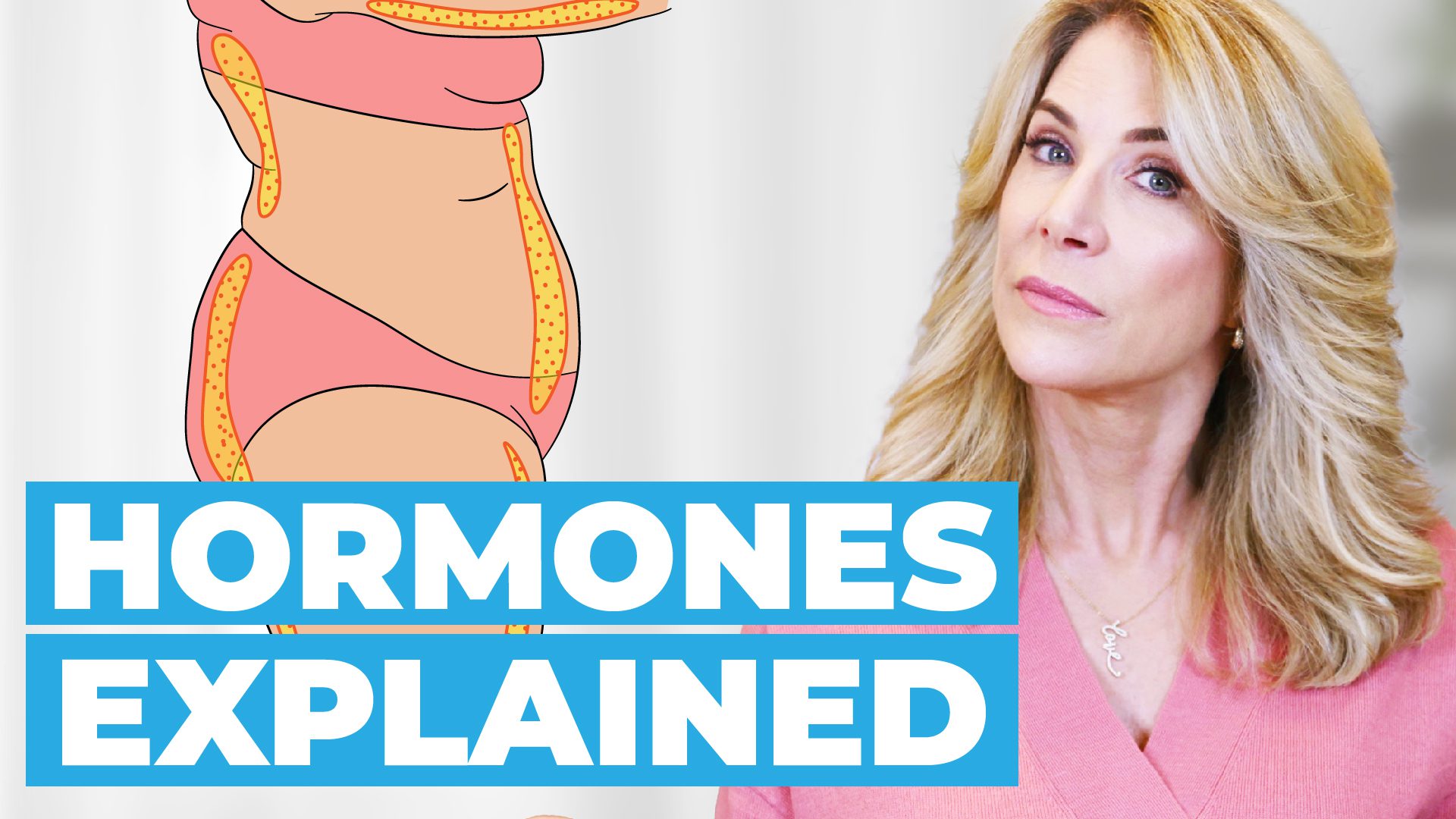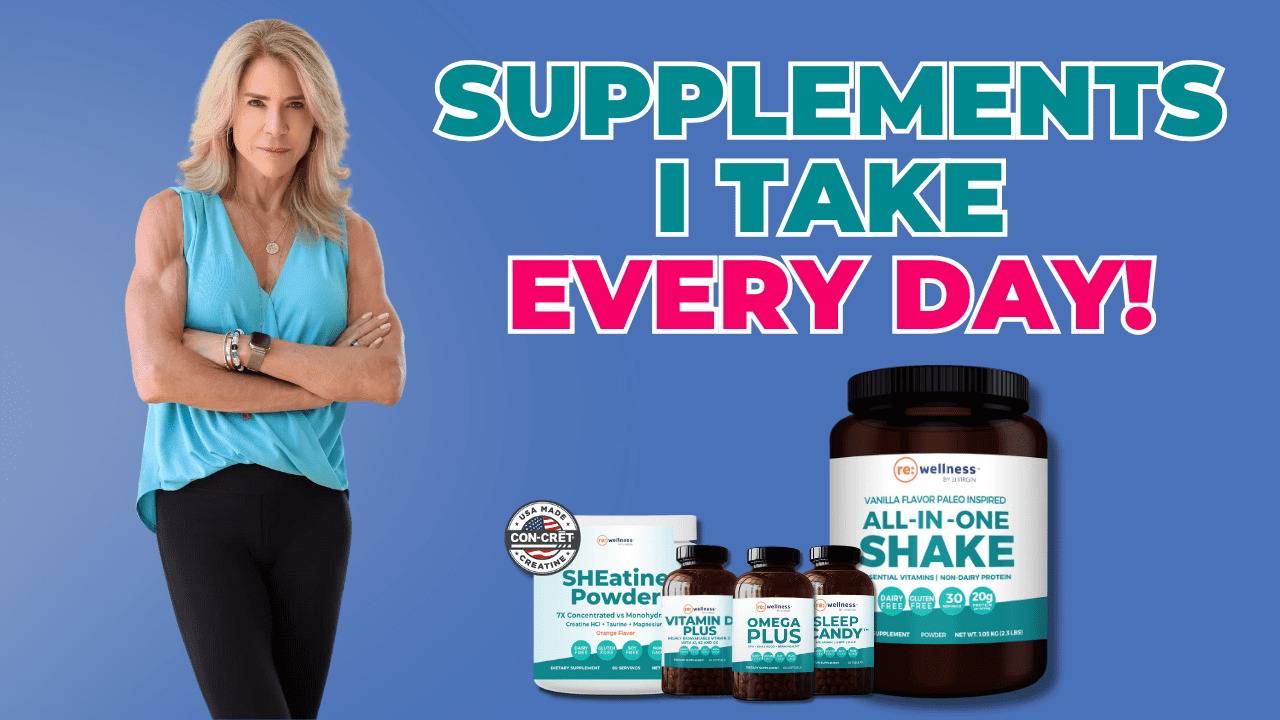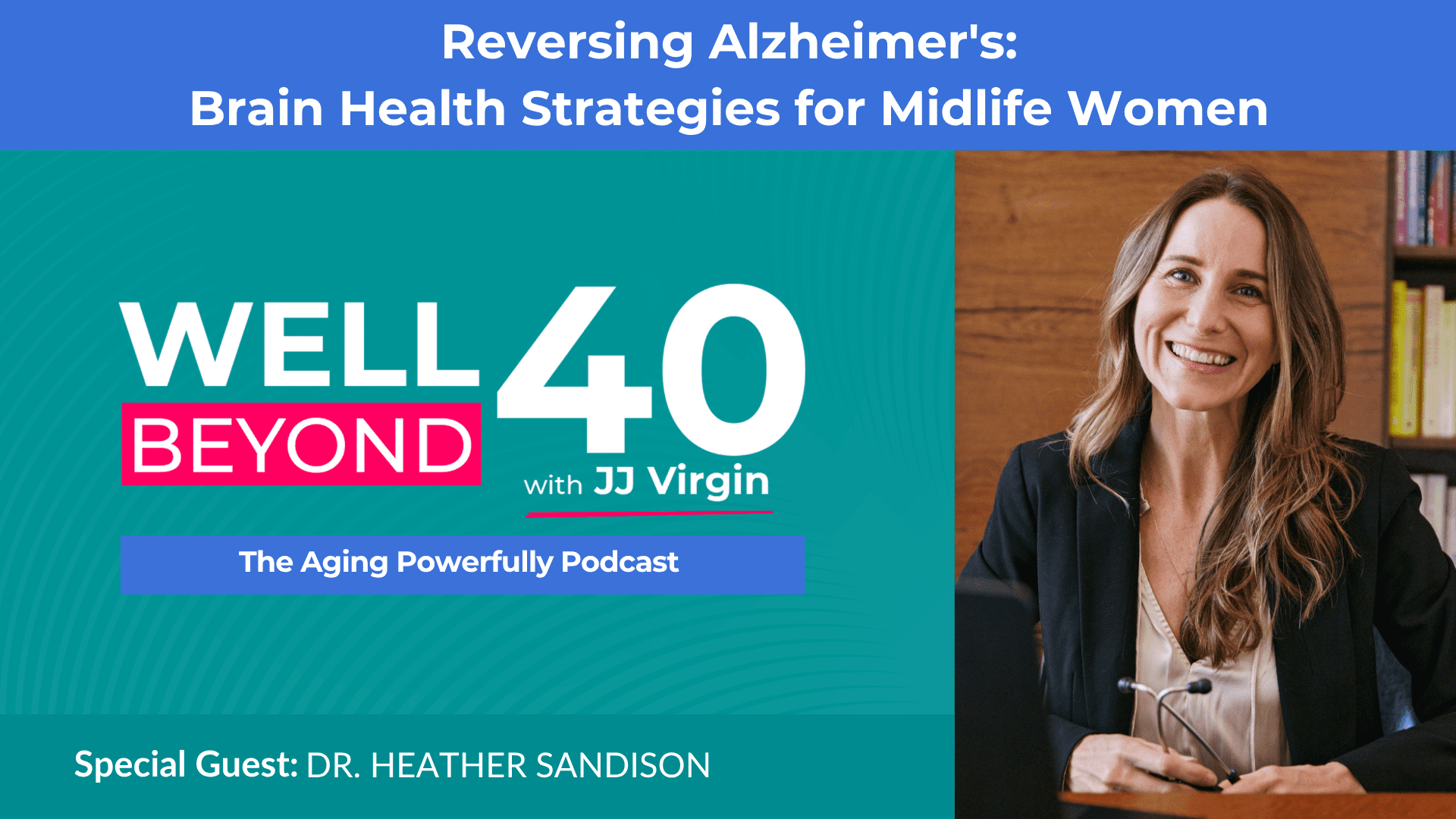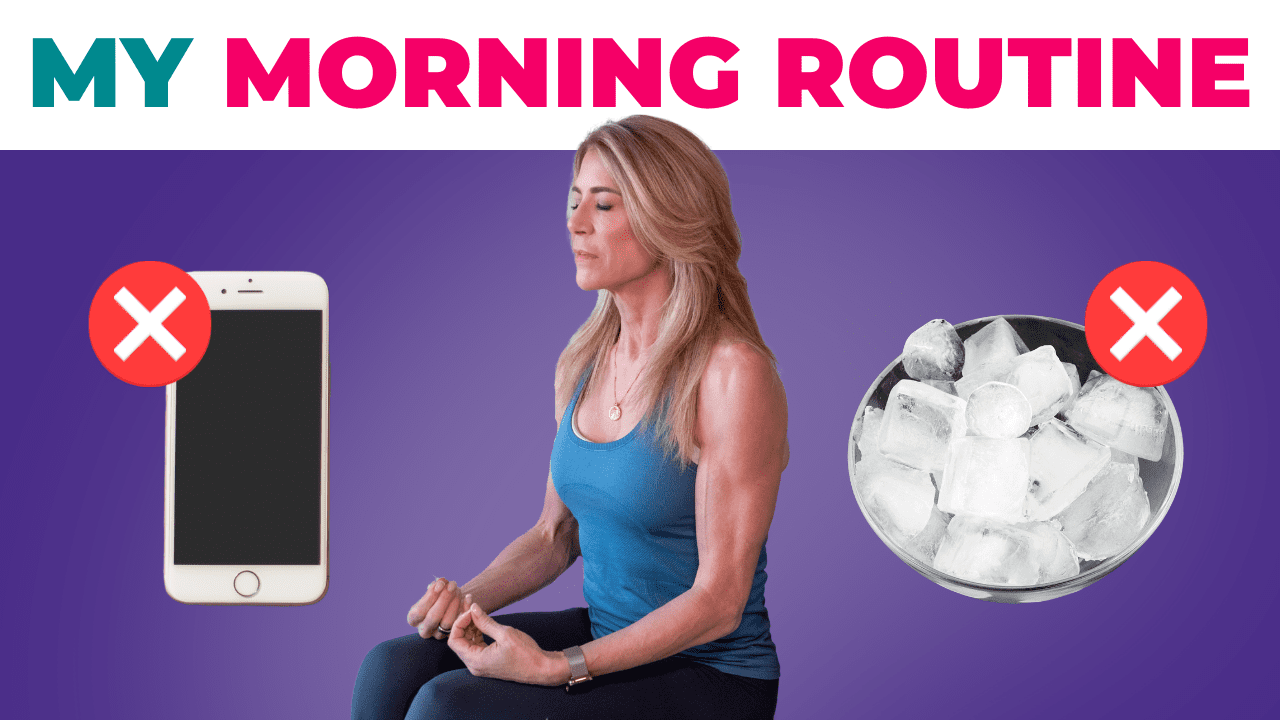Six Hormones to Measure and Monitor for Optimal Health
If metabolism doesn’t slow down til your 60s, why can’t you lose weight now?
Look no further than your hormones. These messengers control hunger, how much fat you hold onto, where you store it, how hard it is to burn it, and so much more. In this episode, I’m explaining which hormones you need to keep an eye on, how they interact with each other, and what you can do to maintain balance.
Timestamps
00:01:22 – This hormone has a significant impact on your weight
00:02:33 – My perfect plate
00:03:39 – Here’s how you improve your insulin sensitivity
00:04:31 – You might not know about these effects of chronically high cortisol
00:06:07 – What do we do about high cortisol?
00:08:06 – Here’s what happens when you’ve got thyroid issues
00:11:16 – This hormone influences where you store body fat
00:13:40 – What can you do if your estrogen levels are dropping?
00:15:07 – We don’t think of this as a female hormone, but it’s crucial
00:16:25 – This hormone opposes estrogen
00:18:32 – Keep this goal in mind when it comes to your hormones
Resources Mentioned in this episode
Watch the FULL VIDEO on my YouTube Channel
Take my 7-Day Eat Protein First Challenge
Reignite Wellness™ All-In-One Shakes
Get wild-caught fish and seafood from Vital Choice
Butcherbox grass-fed & grass-finished beef
Reignite Wellness™ Amino Power Powder
Video: Best Strength Training Routine for Women Over 40 (+ Free Workout Plan!)
Order your own labs at YourLabWork
Video: Simple Tips to Boost Your Thyroid Health
Find a functional medicine doctor: The Institute for Functional Medicine
Get Annatto-GG and DIM in Reignite Wellness™ Menopause Support
Watch my next video: Hormone Balance – Fix Your Hormones With These Foods!
ATHE_Transcript_Ep 632_The Shocking Truth About Hormones and Weight Loss Over 40
JJ Virgin: [00:00:00] I’m JJ Virgin, PhD dropout, sorry mom, turned four time New York Times best selling author. Yes, I’m a certified nutrition specialist, fitness hall of famer, and I speak at health conferences and trainings around the globe. But I’m driven by my insatiable curiosity and love of science to keep asking questions, digging for answers, and sharing the information that I uncover with as many people as I can.
And that’s why I created the Well Beyond 40 podcast to synthesize and simplify the science of health into actionable strategies to help you thrive. In each episode, we’ll talk about what’s working in the world of wellness, from personalized nutrition and healing your metabolism, to healthy aging and prescriptive fitness.
Join me on the journey to better health, so you can love how you look and feel right now and have the energy to play full out at 100.[00:01:00]
You’ve probably heard that your metabolism doesn’t really slow down until around the age of 60, but your body seems to be telling you otherwise. You’ve noticed you can’t seem to lose weight like you used to. So if it’s not metabolism, well, what is it? Look no further than your hormones. Here’s how they impact your weight.
And more importantly, here’s what you can do about it. So the first big one, of course, is insulin. And insulin has a significant impact on your weight because it helps control the storage and utilization of nutrients, particularly carbohydrates and fats. Now, when you eat carbohydrates, you’re going to have blood sugar, glucose in your blood, and then insulin is released in response to that to transport glucose into the cells.
Glucose first is going to get stored as glycogen in the livers and muscles. But if there’s more, the additional is converted to fat and stored in fat tissue, leading to weight gain over time. Now, chronically [00:02:00] high insulin also is going to affect hunger and your fullness cues. You want insulin to come up when you eat, and then you want it to come back down to ideal fasting levels of like 2 to 5.
So, how do you make sure that this happens? First off, my mantra, you’re going to want to eat protein first. The reason that you want to eat protein first is that way I know that you get in the protein that you need. But also, when you eat protein first, it’s more satiating and you tend to make better food choices.
And by better food choices, I mean by eating by the plate. So my perfect plate is clean protein, say something like wild salmon, grass fed and finished beef, where you’re getting great protein sources with all the essential amino acids in the right balance, plus some healthy fats. And then you’re also loading that plate with a lot of non starchy vegetables.
Why do I love this so much is because I just got protein, fat, and fiber. And that is truly the trifecta [00:03:00] for satiety, super important. And let’s face it, if you’re hungry, you’re not going to be able to stay on your eating plan, right? So super important. So that’s the first part of it. Now, also important here with improving insulin sensitivity.
Is resistance training and a little bit on insulin sensitivity. The more sensitive your cells are to insulin, the less insulin response you need to be able to store those nutrients. So you want to be insulin sensitive. We become more insulin resistant as we gain more body fat. As we become more stressed, as we don’t sleep well.
So we want to improve our insulin sensitivity. And here’s how we do that. Number one, resistance training is like the best, fastest way that you can improve your insulin sensitivity. The next one is good sleep. In fact, one poor night of sleep and you’re more insulin resistant. Of course, vitamin D is super important for improving insulin sensitivity as is fish oil.
[00:04:00] So if you’re eating good wild salmon, you got a one two punch there. Next up, cortisol. And boy, when I think about like things really hitting your metabolism and making you store fat, like insulin plus cortisol is a one two punch. So while insulin, we tend to become more insulin resistant as we age, we also tend to have higher cortisol as we age.
And especially this happens in women. Now, chronically elevated cortisol can cause weight gain to a variety of different things. First of all, we’ve got a bunch of cortisol receptors in the belly. So if your cortisol is higher, you tend to store more visceral adipose tissue. Next step, when cortisol is up, it tends to impair quality sleep.
And if you’re not sleeping well, you’re going to have more insulin resistant, like I just talked about, and you’re also going to be hungrier. That is a really bad recipe because if you’re more insulin resistant, you’re better at storing fat, not burning it. And now you’re hungrier and probably eating excess calories.[00:05:00]
So now you’re going to be more likely to store those calories as fat. Next up, when you’ve got chronic cortisol, it can impair your thyroid function. It can also lower testosterone. And lower progesterone. Progesterone can impact that sleep. But now you’ve got lower thyroid, lower testosterone, and that means that you’re going to have more trouble building muscle and you’re going to be more catabolic, which means it can break down muscle.
It can impair muscle protein synthesis. It also can make your gut more permeable and create gut dysbiosis. When that happens, a couple things happen. Number one, you can start to have more cravings. Number two, that gut permeability can make you start to react to foods. And the most common foods that you start to react to are dairy and eggs.
And these can be really great quality proteins, but not if you’re intolerant to them, not if you’re creating this immune response to them because of this intestinal permeability, because then you’ll get this low grade inflammation, and this [00:06:00] low grade inflammation can make it even harder for you to go through muscle protein synthesis.
So this is all a problem. Alright, so what do we do about this? Well, for stress, one of the ways that you can monitor it, it’s kind of like, well, how do I know if this was really an issue? And this is where heart rate variability can be amazing. You want to start to monitor your heart rate variability, find out what’s normal for you and look at how you can improve it.
And then look at the things that impair it. So meditation can be amazing for improving heart rate variability, great night’s sleep, doing the right amount of exercise, and especially high intensity interval training, but the right amount. Too much exercise, you’ll see your heart rate variability goes down.
You want a higher heart rate variability. Supplements can help here as well. GABA, B vitamins, glycine, my Take 10 stress support, vitamin C, because the number one vitamin used by the adrenal glands is vitamin C. So this can be super big for this. And some of the adaptogens, especially [00:07:00] rhodiola and ashwagandha.
But again, it’s challenging with cortisol because it’s sort of like, how do you really tell what’s going on with stress? When you go get a lab test, generally they’ll do an early morning at 8 a. m. cortisol test, but this is just a snapshot. So a way to really be able to tell what’s going on. Is to go do an adrenal salivary index where you spit throughout the day and it tracks it to see if you’ve got elevated cortisol, or maybe now you’ve got adrenal gland exhaustion, or maybe your curve is backwards to where it should be.
But an easier way to monitor this on a daily basis is to get to know that heart rate variability. You can track it through a Whoop or an Oura Ring or an Apple Watch, and then to really start to work on how you get that to a higher level for you. And the next one is thyroid, and one of the things that you’ll start to see with everything we’re talking about is they all impact each other.
Because when I talk about thyroid, if you are under chronic stress, this, of course, can [00:08:00] impair your body’s conversion from inactive T4 thyroid to T3 thyroid. If you’ve got issues with your thyroid, this is going to be a few issues with your metabolism because ultimately, like, the big predictor of your metabolic rate The big governor of it is your thyroid.
If your thyroid is underactive, you’re probably going to be hungrier, but you’re also going to have reduced calorie burning, which is going to be problematic for you being able to build muscle. Thyroid hormones, especially T4 and T3, impact hormones that regulate appetite and metabolism like leptin and ghrelin, and an underactive thyroid can disrupt the balance of these hormones.
Which again, can lead to being hungrier and not feeling as full. And again, one of the biggest challenges with all of this is if you’re hungry, you will tend to overeat. If you overeat, you’re going to tend to gain weight, right? And then we also know hyperthyroidism can have psychological effects. It can give you [00:09:00] mood changes like depression and anxiety.
And sometimes when you have depression and anxiety. That also can lead to overeating because you’re using food to stuff those feelings, right? Or maybe you’ve got some cravings. Now another thing about thyroid hormones, T3 and T4, is that you need them for energy production within the body’s cells. And if your thyroid hormone levels are low, the cells may not be making enough energy for proper muscle function, which means you got weak muscles.
You’ve got less stamina, so you’re not going to be able to work out as hard as you want. And of course, if you’re not as active as you can be, then you’re going to burn lower calories, which can also contribute to weight gain. Now another thing with thyroid is that thyroid can influence muscle protein synthesis.
Which is mission critical, right, for building muscle. In hypothyroidism, you have reduced availability of thyroid hormones, which then impairs the body’s ability to build and repair muscle tissue. Plus people with hypothyroidism may [00:10:00] also take longer to recover after exercise. So they’re not able to repair that tissue after they do that damage.
So thyroid’s super duper important here, and here’s the deal, the labs are what are the average out there. They’re not what’s optimal. Like every functional medicine doctor I’ve talked to has said, gosh, those thyroid labs is not where you want to be, where you’ll see the range from, I think it’s 0. 1 all the way up to 4.
5. Where we really want to see someone in a TSH is somewhere in the 0. 5 to 1. 5 range. So you want to have a complete thyroid panel where you’re looking at your TSH, your free T3 and T4 and your thyroid antibodies, and possibly even your reverse T3 to really get that full picture of what’s going on with your thyroid.
And then depending on that, plus symptoms. And there’s some classic symptoms. By the way, I did a YouTube video on simple tips to boost your thyroid health and also talked about some of the different symptoms like constipation, losing the outer third of your [00:11:00] eyebrow, having a little yellowing of the skin, not being able to build muscle, being depressed.
Elevated LDL, that plus lab tests, you really want to work with the doctor on how to improve those numbers and potentially need to take some thyroid hormone. All right, estrogen. So estrogen is super interesting because estrogen is going to influence where your body fat is. When you have higher estrogen, that’s where you tend to have that more favorable female body fat distribution, which means that you’re going to have more subcutaneous fat rather than visceral adipose tissue, which is what we want.
You’ll tend to have more fat in your hips and thighs, and you won’t have that big belly fat. But things change. As you start to go into perimenopause and estrogen starts to drop significantly. In fact, my mom called this shifting SAMS, where basically you lost your butt and it went into your gut. And I remember thinking, I am not letting that one happen to me, but that is a [00:12:00] sign of low estrogen is all of a sudden you’re losing the thigh and the butt fat, which at first you might be going great, except that all of a sudden now it’s going into your belly fat and that’s that visceral adipose tissue.
Which is really, really problematic. Now I’ll tell you, when I was seeing a lot of people one on one, I could tell before I even talked to them, when I would look at their labs, if their estrogen was low and they weren’t on hormone replacement therapy, because I’d see it in their cardiovascular markers. I would see it in something called highly sensitive CRP.
Their inflammation went up, their cardiovascular markers that can signal a problem like ApoB, LDL. would go up. So this is where you want to really look at estrogen and go, if your estrogen is low, you’re going to want to talk to your functional medicine doctor about replacing it because estrogen is mission critical, not just for body fat.
And making sure that you are not gaining that visceral adipose tissue and making sure that you can build muscle. [00:13:00] But estrogen is important for heart health, bone health, and brain health. And I have done multiple podcasts now with doctors talking through the women’s health initiative and how wrong it was and how important HRT can be because estrogen has big, hard, effective effects, right?
Including improving cholesterol profiles. And maintaining healthy blood vessels. It also helps maintain bone density and strength and prevents excessive bone loss and reduces the risk of osteoporosis. Plus it’s neuroprotective and may support cognitive function. It can affect memory. It can affect mood.
And it can affect overall brain health. So if your estrogen is going down, what can you do? Couple different things. Number one, look at the supplement DIMM because DIMM helps detoxify. We’ve got multiple different types of estrogen, estreon, estriol, estrone, and estradiol, and the estrone is the one that we really need to [00:14:00] detoxify.
Well, DIMM helps you do that. Some isoflavones, things from garbanzo beans, sesame seeds. Can help you boost a little bit of your own body’s estrogen by being a phytoestrogen. And you can also support your adrenal health because as you start to go through menopause, you’re going to produce more of your hormones through your adrenals, more of your estrogen through your adrenals.
So supporting good adrenal health, like we talked about, cortisol can be important here as well. And then of course, talking to your functional medicine doctor about looking at hormone replacement therapy. And if it is the right thing for you, I will tell you, I was just at an event speaking and was going through like my three pillars of eating protein first and doing hard things and sleeping through the night.
And this woman came up, she goes, I’ve been doing all of these things for five years and nothing seems to be working. And she’d gone through menopause and it was like, she was doing everything, but she didn’t have the hormones on board. I’m like, go get yourself a function medicine doctor and get your hormones on board [00:15:00] because if you can’t get to where you need to be with diet and lifestyle alone, and your hormones are tanked, you need the help.
Now, one of the other things that you want to look at replacing beyond just optimizing thyroid function, and then estrogen is the next one’s testosterone, which by the way, for women, we have more testosterone than estrogen. You don’t think of it as this female hormone, but it is definitely mission critical for us for muscle mass, for libido.
It helps us maintain our lean body mass and it supports, of course, muscle strength. It’s this anabolic hormone, so super important. And of course, when we have good lean body mass, it’s going to help us with having a better metabolic rate. It also is important for helping with maintaining bone density. So it may be that you can get some boost of testosterone by taking DHEA.
Sometimes that can be enough, but quite often we need to supplement it with it as well. A couple of things that can help you. With elevating testosterone or lifting weights, getting in healthy fats in your [00:16:00] diet, having some carbohydrates in your evening meal before sleep, and competition. Now, I don’t know if it does it for women.
I know with men, competition, being involved in competition can raise their testosterone. Even watching competitions can raise their testosterone. Don’t know about that for women, but this again is one that you want to monitor and talk to your functional medicine doctor about. Now, when you think of estrogen, what opposes estrogen is progesterone.
So these work together, and when you’re a cycling female, this is produced in the second half of your cycle after ovulation, right? This is the first one that tends to go down as you go into perimenopause, which then all of a sudden you’re having crappy sleep, your mood starts to go sideways, right?
However, if you just arbitrarily start taking lots of progesterone, this can actually encourage more fat stores and some insulin resistance. The only time we really tend to get insulin resistant easily is [00:17:00] during pregnancy when we’ve got steady higher levels of progesterone that promote insulin resistance and fat storage, specifically in the hips and thighs.
Both estrogen and progesterone will put that fat around the hips and thighs. But estrogen does it probably a little bit more than progesterone does. Now, in the right amount, it can have a little bit of a thermogenic effect. But remember, with these hormones, it’s all about the balance. That’s why you want to do what you can through diet and lifestyle first.
Really make sure that you’ve got cortisol working well, that you’re supporting your adrenal glands. During perimenopause, And menopause, super important to focus on your adrenal glands and making sure your thyroid is working well because you cannot balance your hormones without that. Quite often when you get those things really dialed and get in your sleep and your exercise and your diet, then you can look and go, what’s the minimal dose I need of these hormones working with a functional medicine doctor to feel good and have the benefits from them?
Now, when you look at bone health, you’ve got estrogen and [00:18:00] progesterone that are important here because you’ve got estrogen. Helping maintain bone density by inhibiting bone resorption, inhibiting the breakdown of bone, and then progesterone helps stimulate bone formation. Plus, progesterone is really helpful for sleep.
When I take progesterone, I’ll cycle it in. I do it in the evening because it acts like kind of a sedative for the central nervous system and it helps interact with GABA. Receptors in the brain. So again, it’s good for relaxation. Now, again, the goal with hormones is do as much as you possibly can through diet and lifestyle.
And as you start to get into your forties, you lose that margin for error of the way you used to be able to live. So sleep and stress and exercise, super mission critical. And then of course. Eating correctly. Remember, eat protein first. Your hormones are made from protein. You need to have quality protein [00:19:00] on board.
Then you’re going to make it so easy when you go into work with the functional medicine doctor, because you’ve done all of the heavy lifting. Now you can look at labs and symptoms with them and then get the right amount for you right then and not overload or not have enough. Now. Best place to start here, of course, is to fix what’s at the end of your fork.
So I have got a video on hormone balance, how to fix your hormones with these specific foods, up next. Be sure to join me next time for more tools, tips, and techniques you can incorporate into everyday life to ensure you look and feel great, and more importantly, that you’re built to last. And check me out on Instagram, Facebook, YouTube.
And my website, jjvirgin.com. And make sure to follow my podcast so you don’t miss a single episode at subscribetojj.com. See you next time.[00:20:00]
Hide Transcript

 Subscribe to our show
Subscribe to our show 




